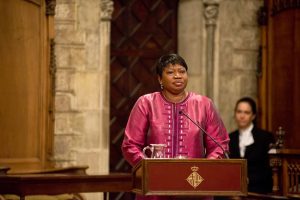Yesterday brought news that the outgoing chief prosecutor at the International Criminal Court (ICC) has requested an authorization to open an investigation into Philippine President Rodrigo Duterte’s blood-stained anti-drugs campaign.
In a statement, ICC Prosecutor Fatou Bensouda formally asked for an investigation of drug war killings between 2016, when the populist Duterte took office, and 2019, when the Philippines formally withdrew from the ICC.
“I have determined that there is a reasonable basis to believe that the crime against humanity of murder has been committed on the territory of the Philippines between 1 July 2016 and 16 March 2019 in the context of the Government of Philippines ‘war on drugs’ campaign,” she said in the statement.
“The available information indicates that members of the Philippine national police, and others acting in concert with them, have unlawfully killed between several thousand and tens of thousands of civilians.” Bensouda, whose term of office ends today, added that “any authorized investigation in the Philippines will fall to my able successor, Karim Khan, to take forward.”
Shortly after taking office in June 2016, Duterte launched a wide-ranging crackdown on illegal narcotics, modeled on the uncompromising anti-crime measures that he had employed during his long tenure as mayor of Davao City on the southern island of Mindanao.
The full death toll of the ongoing campaign is unclear. The government’s own data puts the total at 6,117 people since the beginning of the campaign, but independent estimates of the toll claim the total amounts to anywhere from 12,000 to more than 20,000.
In December, Bensouda stated that was “satisfied” that various crimes of humanity – from murder and torture to the infliction of serious physical injury and mental harm – had been committed during the campaign. Her office claimed that many of the people killed in Duterte’s crackdown had been on a drug watch list compiled by authorities or had previously surrendered to police, while a significant number of victims were minors.
The move has been warmly welcomed by Duterte’s many domestic opponents. Sonny Trillanes IV, a former senator and leading critic of the Philippine leader, described the ICC’s move as “another monumental step towards justice” for the families of those killed in the anti-drugs campaign. “The long arm of the law will soon catch up with Duterte and his accomplices,” Trillanes wrote on Twitter.
However, the ICC cannot expect much cooperation from the Duterte administration during its last year in office. When The Hague-based court first announced its intention to probe the Philippine leader’s anti-drug campaign, Duterte withdrew the Philippines from the Rome Statute that established the court, a decision that took effect in March 2019.
Sure enough, the initial response from the presidential Palace has been dismissive. Bensouda’s announcement was “legally erroneous” and “politically motivated,” presidential spokesperson and former human rights lawyer Harry Roque said today, adding that Duterte president “will never cooperate” with the investigation. For further measure, he added that the claims of extrajudicial killings emanated from “communists and politicians who are enemies of the president.”
In a slightly more diplomatic tone, the Department of Foreign Affairs issued a statement in which it described Bensouda’s announcement as “deeply regrettable.” Citing the Philippine government’s own reviews of a handful of drug war killings, it also asserted that her decision was “a blatant violation” of the Rome Statute’s principle of complementarity, which states that the ICC only comes into play that governments are unwilling or unable to investigate crimes themselves. (Myanmar’s recently deposed leader Aung San Suu Kyi advanced a similar argument in defending her government from accusations of genocide over its treatment of the Muslim Rohingya.)
Will Duterte ever see the inside of an ICC courtroom? As in so many other contexts, a lot depends on politics – in particular, on the outcome of next year’s presidential election, which marks the end of Duterte’s single six-year term. A host of Duterte allies are now jostling for primacy ahead of the election, including Sara Duterte-Carpio, his daughter and successor as mayor of Davao City, and Ferdinand Marcos Jr, the son of the late dictator. Meanwhile, Duterte is himself mooting a possible run as his party’s candidate for vice president.
Any forward momentum on domestic or international accountability for the war on drugs relies heavily on the election’s outcome. Given the popularity of the Philippine president in general and his “war on drugs” in particular, the end of the Duterte era in Philippine politics is not something that can be taken for granted.
The stakes for incumbent presidents are usually low in the Philippines, given the country’s single-term limit. But the ICC investigation now looms as an interesting and unpredictable factor in the 2022 presidential election, giving Duterte added incentive to ensure that his party retains its grip on the levers of executive power for another six years.
































